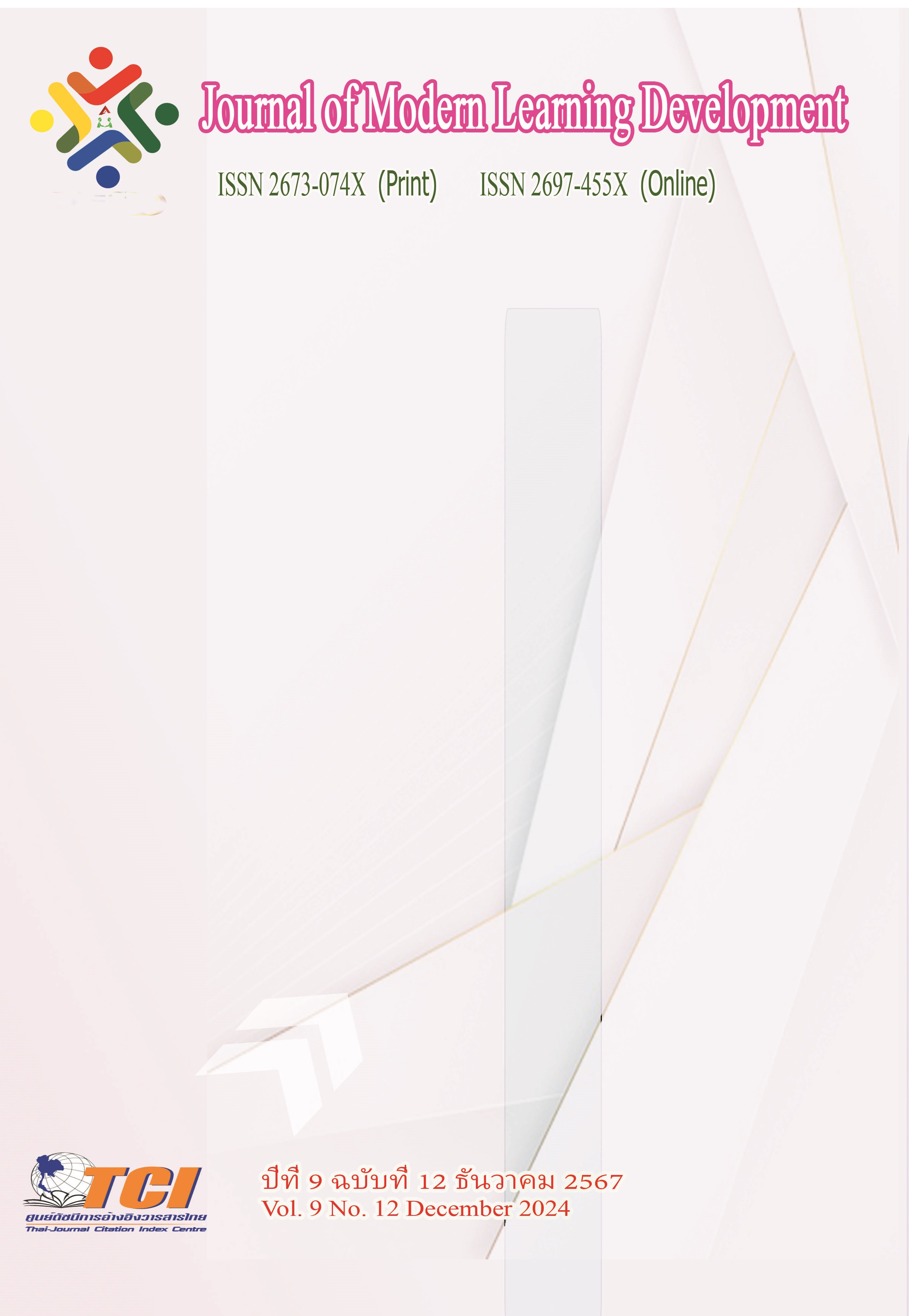ปัจจัยองค์กรนวัตกรรมที่ส่งผลต่อประสิทธิภาพนวัตกรรมทางการศึกษาของโรงเรียน ในสังกัดสำนักงานเขตพื้นที่การศึกษาประถมศึกษานครปฐม เขต 1
Main Article Content
บทคัดย่อ
การวิจัยมีวัตถุประสงค์เพื่อศึกษา (1) ระดับปัจจัยองค์กรนวัตกรรมของโรงเรียนในสังกัดสำนักงานเขตพื้นที่การศึกษาประถมศึกษานครปฐม เขต 1 (2) ระดับประสิทธิภาพนวัตกรรมทางการศึกษาของโรงเรียนในสังกัดสำนักงานเขตพื้นที่การศึกษาประถมศึกษานครปฐม เขต 1 (3) สมการพยากรณ์ของปัจจัยองค์กรนวัตกรรมที่ส่งผลต่อประสิทธิภาพนวัตกรรมทางการศึกษาของโรงเรียนในสังกัดสำนักงานเขตพื้นที่การศึกษาประถมศึกษานครปฐม เขต 1 และ (4) รูปแบบปัจจัยองค์กรนวัตกรรมในการพัฒนาประสิทธิภาพนวัตกรรมทางการศึกษาของโรงเรียนในสังกัดสำนักงานเขตพื้นที่การศึกษาประถมศึกษานครปฐม เขต 1 ทั้งนี้ การวิจัยระยะที่ 1 เป็นการวิจัยเชิงปริมาณ กลุ่มตัวอย่างที่ใช้ในการวิจัย จำนวน 318 คน และใช้แบบสอบถามเป็นเครื่องมือในการเก็บข้อมูล สำหรับการวิจัยระยะที่ 2 เป็นการวิจัยเชิงคุณภาพ โดยแบ่งเป็น 2 ขั้นตอนคือ (1) การสัมภาษณ์เชิงลึก และ (2) การประชุมกลุ่มย่อย
ผลการวิจัยพบว่า (1) ระดับปัจจัยองค์กรนวัตกรรม โดยรวมอยู่ในระดับมาก (2) ระดับประสิทธิภาพนวัตกรรมทางการศึกษา โดยรวมอยู่ในระดับมาก (3) ปัจจัยองค์กรนวัตกรรมมีค่าความสัมพันธ์กับประสิทธิภาพนวัตกรรมทางการศึกษาอยู่ในระดับปานกลาง เท่ากับ .655 อย่างมีนัยสำคัญทางสถิติที่ระดับ .01 (4) ปัจจัยองค์กรนวัตกรรมที่ส่งผลต่อประสิทธิภาพนวัตกรรมทางการศึกษา สามารถอธิบายสมการพยากรณ์ได้ร้อยละ 64.80 อย่างมีนัยสำคัญทางสถิติที่ระดับ .01 (5) ปัจจัยองค์กรนวัตกรรมที่ได้จากการวิจัยเชิงคุณภาพ จำนวน 11 ปัจจัย ได้แก่ ปัจจัยผู้นำเชิงวิสัยทัศน์นวัตกรรม ปัจจัยกระบวนการดำเนินงาน ปัจจัยวัฒนธรรมองค์กรนวัตกรรม ปัจจัยการสื่อสารข้อมูล ปัจจัยนโยบายและกลยุทธ์ ปัจจัยองค์กรแห่งการเรียนรู้ ปัจจัยแรงจูงใจ ปัจจัยเครือข่ายนวัตกรรม ทีมงานนวัตกรรม ปัจจัยการประเมินผลนวัตกรรม และปัจจัยการมีส่วนร่วม และ (6) ประสิทธิภาพนวัตกรรมทางการศึกษาที่ได้จากการวิจัยเชิงคุณภาพ จำนวน 5 ด้าน ได้แก่ นวัตกรรมด้านหลักสูตรเพื่อพัฒนาชุมชน นวัตกรรมด้านรูปแบบการสอนโดยใช้ปรากฏการณ์ทางสังคมเป็นฐาน นวัตกรรมด้านสื่อการสอนยุคดิจิทัล นวัตกรรมด้านดิจิทัลเพื่อการบริหารสถานศึกษา และนวัตกรรมด้านการพัฒนาผู้เรียน
Article Details
เอกสารอ้างอิง
กระทรวงศึกษาธิการ. (2566). พระราชบัญญัติการศึกษาแห่งชาติ พ.ศ. 2542. สืบค้นเมื่อ 1 กันยายน 2566, จาก https://www.moe.go.th/พรบ-การศึกษาแห่งชาติ-พ-ศ-2542/
กัลยารัตน์ ธีระธนชัยกุล. (2564). ปัจจัยเหตุและผลของการเป็นองค์กรแห่งนวัตกรรมของธุรกิจวิสาหกิจขนาดกลางและขนาดย่อมภาคบริการของประเทศไทย. สาขาวิชาการบริหารและการจัดการสมัยใหม่ คณะบริหารธุรกิจ มหาวิทยาลัยศรีปทุม.
ชูชาติ พ่วงสมจิตร์. (2560). แนวคิดเกี่ยวกับนวัตกรรมการบริหารการศึกษาและภาวะผู้นํา. นนทบุรี : มหาวิทยาลัย สุโขทัยธรรมาธิราช.
มหาวิทยาลัยรังสิต. (2549). นวัตกรรมการเรียนการสอน. วารสารสนับสนุนและพัฒนาการเรียนการสอน, 1(3), 1-3.
วรวิทย์ นิเทศศิลป์. (2551). สื่อและนวัตกรรมแห่งการเรียนรู้. ปทุมธานี: สกายบุ๊ค.
วารุณี กุลรัตนาวิจิตรา. (2560). ปัจจัยด้านนวัตกรรมทางธุรกิจส่งผลต่อการดำเนินงานของธุรกิจขนาดกลางและขนาดย่อม (ประเภทบริการ). วิทยาศาสตรมหาบัณฑิต สาขาการบริหารเทคโนโลยี วิทยาลัยนวัตกรรม มหาวิทยาลัยธรรมศาสตร์.
วุฒิพงษ์ ภักดีเหลา. (2554). การศึกษาคุณลักษณะขององค์การนวัตกรรม: กรณีศึกษาองค์การที่ได้รับรางวัลด้านนวัตกรรม. วิทยาศาสตรมหาบัณฑิต (การพัฒนาทรัพยากรมนุษย์และองค์การ) คณะพัฒนาทรัพยากรมนุษย์ สถาบันบัณฑิตพัฒนบริหารศาสตร์.
สุคนธ์ สินธพานนท์. (2565). นวัตกรรมการเรียนรู้สู่การพัฒนาการศึกษา. สืบค้นเมื่อ 17 กันยายน 2566, จาก http://sites.google.com/site/supoldee/supoldee/nwatkrrm-reiyn-ru
สุริศา ริมคีรี (2562). การพัฒนาตัวบ่งชี้องค์การแห่งนวัตกรรมการศึกษาของโรงเรียนมัธยมศึกษาสังกัดสำนักงานคณะกรรมการการศึกษาขั้นพื้นฐาน. ปรัชญาดุษฎีบัณฑิต สาขาวิชาการบริหารการศึกษา คณะศึกษาศาสตร์ มหาวิทยาลัยบูรพา.
อรอนงค์ โรจน์วัฒนบูลย์. (2553). การพัฒนาตัวแบบผู้นำเชิงนวัตกรรม. รัฐประศาสนศาสตรดุษฎีบัณฑิต คณะรัฐประศาสนศาสตร์ สถาบันบัณฑิตพัฒนบริหารศาสตร์.
Adair, John E. (1996). Effective Innovation: How to Stay Ahead of The Competition. London: Pan Books.
Harvard Business School. (2003). Managing Creativity and Innovation. Boston: Harvard Business School Press.
Hay Group. (2005). The Innovative Organization: Lessons Learned from Most Admired Companies. Hay Insight Selections. Retrieved April 2, 2009 from http://www.haygroup. com/downloads/es/Hay_Insight_Selections_April_2005.pdf.
Tidd, Joe; Bessant, John and Pavitt, Keitk. (2001). Managing Innovation Integrating Technological Market and Organization Change. Chichester: John Willey & Sons.
Yamane, Taro. (1973). Statistics; An Introduction Analysis. Harper International Edition, Tokyo.


